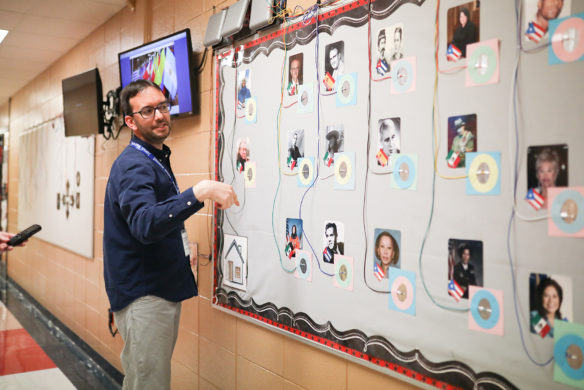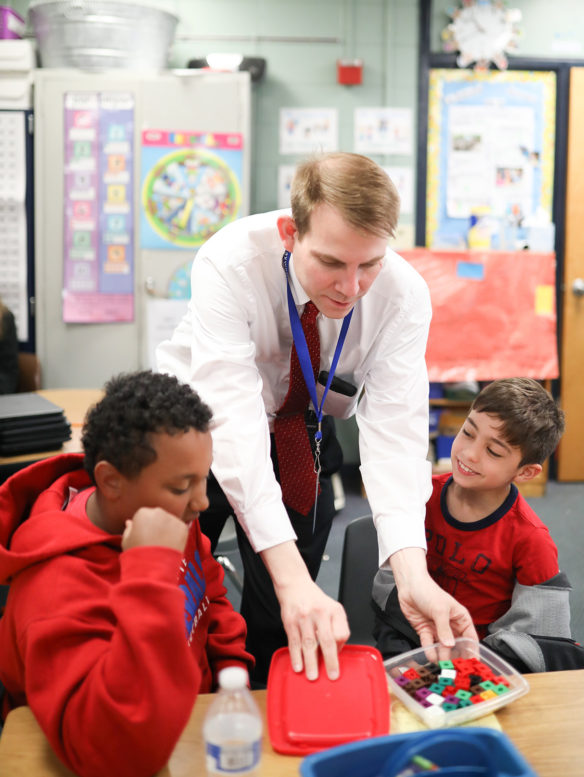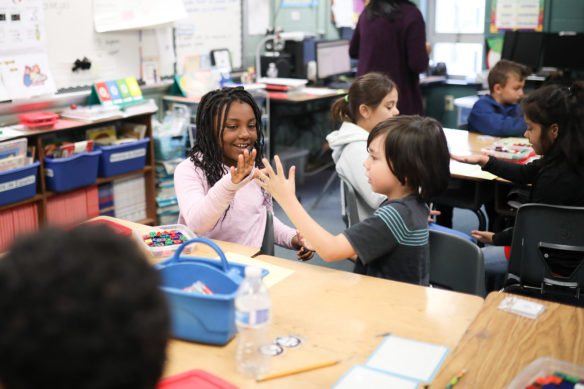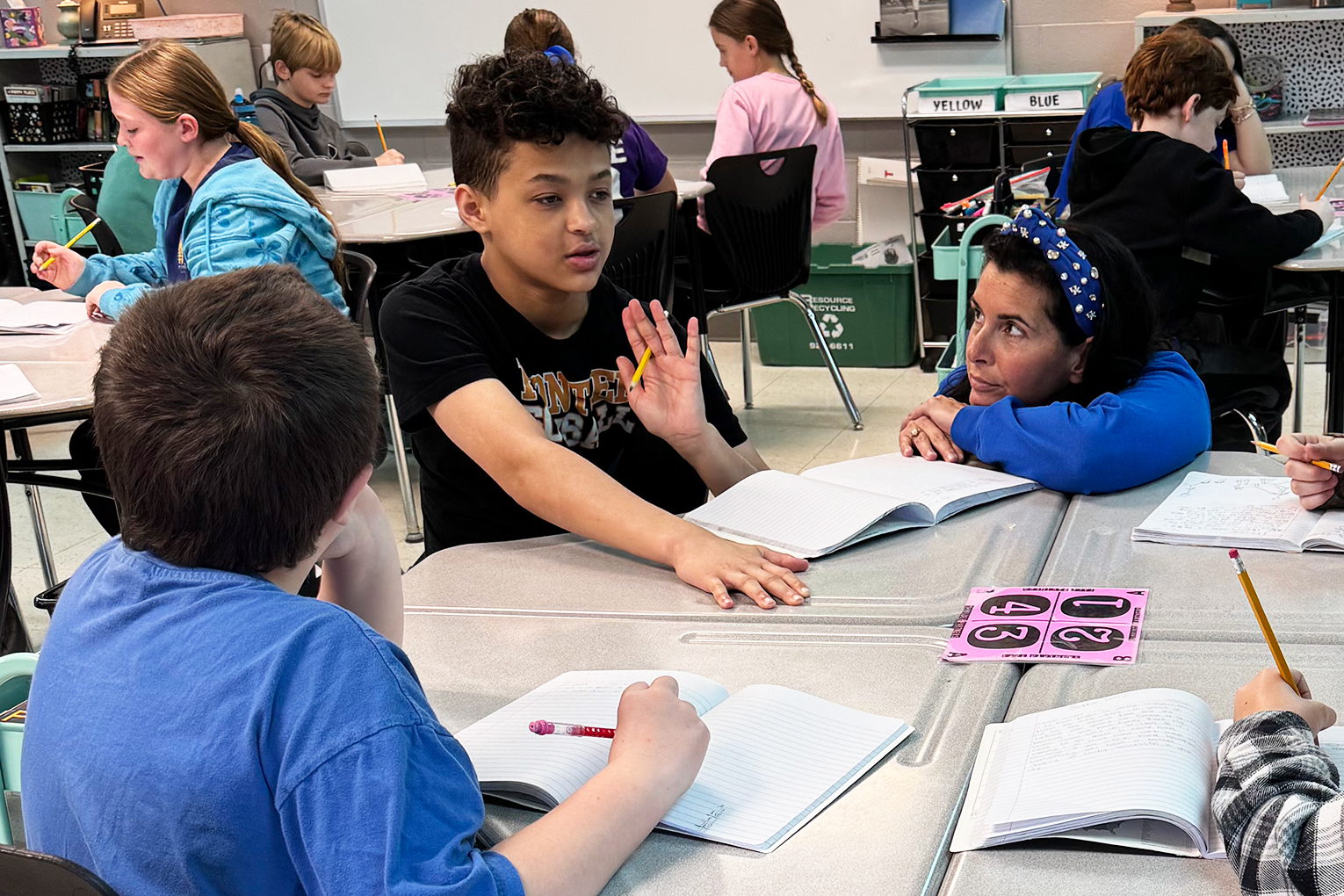
David Mato, instructional media teacher at Maxwell Elementary School (Fayette County), shows off the interactive bulletin board created by the school’s STLP students. The Embassy of Spain’s Education office in Washington, D.C., recognized the work of Maxwell and named it as the 2018-2019 School of the Year. This award goes to schools in the United States that demonstrate excellence in content and language integrated learning programs in English and Spanish.
Photo by Megan Gross, April 15, 2019
- Maxwell is a 50-50 immersion school. This means that students spend 50 percent of the day learning in English and 50 percent of the day learning in Spanish.
- Every month, the students at Maxwell study a different Spanish-speaking country
By Jacob Perkins
Jacob.perkins@education.ky.gov
Somos Maxwell is more than a slogan for Maxwell Elementary (Fayette County).
“We say ‘Somos Maxwell,’ which means ‘We Are Maxwell,’” said Principal Robert Crawford. “We think about being kind, being cooperative, responsible and respectful. Not only in the local context, but at the global scale.”
The Embassy of Spain’s Education office in Washington, D.C., recognized the work of Maxwell and named it as the 2018-2019 School of the Year. This award goes to schools in the United States that demonstrate excellence in content and language integrated learning programs in English and Spanish.
“The official notification from the Education Office of the Embassy of Spain cited the exemplary daily work, as evidenced by the materials presented in the portfolio submitted for the contest.” Crawford said.
Laura Roché Youngworth, world language content specialist for Fayette County Schools, said that when the district found out that Maxwell was a finalist for the award, it shared the news as if Maxwell had already won.
“To find out that Maxwell’s vision for educating students as bilingual learners and the hard work of their leadership and faculty to achieve this goal earned them national recognition, it was a moment to remember,” Youngworth said.

Maxwell Elementary Principal Robert Crawford, center, assists Darius Surratt, left, and Felipe Moreira with a game in their mathematics class. Mathematics and — depending on the grade level — science and social studies, are taught in Spanish at Maxwell.
Photo by Megan Gross, April 15, 2019
Maxwell is a 50-50 immersion school. This means that students spend 50 percent of the day learning in English and the other 50 percent in Spanish.
At Maxwell, the students learn their reading and writing in English. Mathematics and – depending on the grade level – science and social studies are taught in Spanish. Three out of four of Maxwell’s special areas – which include media, music and Spanish cultural arts – also are taught in Spanish.
“One of the practices that has worked well with Maxwell is ensuring that students have access to both languages every day,” Crawford said. “Specifically, students spend at least half of the day or more in the Spanish language. Providing a structure for students to receive daily language input and then have the opportunity to actively engage in interpersonal communication is vital to the success of the program.”
Maxwell is one of nine active immersion schools in Kentucky, six are in Lexington and three are in Louisville. Being the oldest immersion program in the state, Maxwell has a lot of lessons to provide to new schools or programs. Crawford said one of the most important things to remember as an immersion school is balance.
“The school must ensure that students are simultaneously developing academic content knowledge while acquiring Spanish language skills,” said Crawford. “The program must attend to the sociocultural competencies of learners by providing students with authentic access to cultural practices, products and perspectives.
“All must remain in equilibrium in order for a learner to experience the full benefit of the program. The key lesson is that every aspect of the program planning and implementation must be intentional and must account for content, language and culture.”

Maxwell Elementary students Kimora Alexander, from left, and Silas Garcia play a game in the their mathematics class. Maxwell is a 50-50 immersion school. This means that students spend 50 percent of the day learning in English and 50 percent of the day learning in Spanish.
Photo by Megan Gross, April 15, 2019
Every month, the students at Maxwell study a different Spanish-speaking country. During the month, songs from the country are played on the intercom in the morning for the students. Facts and photos of the country are displayed on an interactive bulletin board created by the school’s STLP students.
“The kids realized that the boards that we have are not interactive, they are just boards with papers,” Instructional Media Teacher David Mato said. “The students said, ‘Let’s make something that we can touch and interact with.’”
Mato said the students created the board using Makey-Makey, Raspberry Pi and the software programming language Scratch.
Not only is the interactive board used for the country of the month, but the students also are programming a video game that can be played on the board and they are programming it to read a book to kindergarten students.
“The students here, because this is a public school, get the same content that the students get in the regular schools,” Mato said. “We follow the same standards. But at the same time, the students are learning a second language.”
Crawford said that not only do the student’s at Maxwell learn the second language, but they also get to build their global understanding.
“Students in immersion schools, in addition to obviously developing proficiency in the language that they’re studying, really develop global dispositions and have the global competency components.” Crawford said.
Youngworth said those global competency skills are vital for students in an increasingly diverse workforce.
“The work environment that our students are now entering is more diverse and more global than ever before,” she said. “In addition to collaborative workers who can think critically and use technology seamlessly to achieve goals, immersion students are able to communicate with others in multiple languages, which is a skill set needed more and more by industries not only in Kentucky, but across the United States.
“Imagine workers who can speak, listen, write and read in English and another world language. Workers who understand cultural nuances and can apply this knowledge to what they are doing. Immersion programs are preparing a workforce that will stand out and make a positive impact on businesses and industries.”
MORE INFO …
Robert Crawford robert.crawford@fayette.kyschools.us
David Mato david.mato@fayette.kyschools.us
Laura Roché Youngworth laura.roche@fayette.kyschools.us
Maxwell portfolio: https://sites.google.com/fayette.kyschools.us/maxwell/home




Leave A Comment